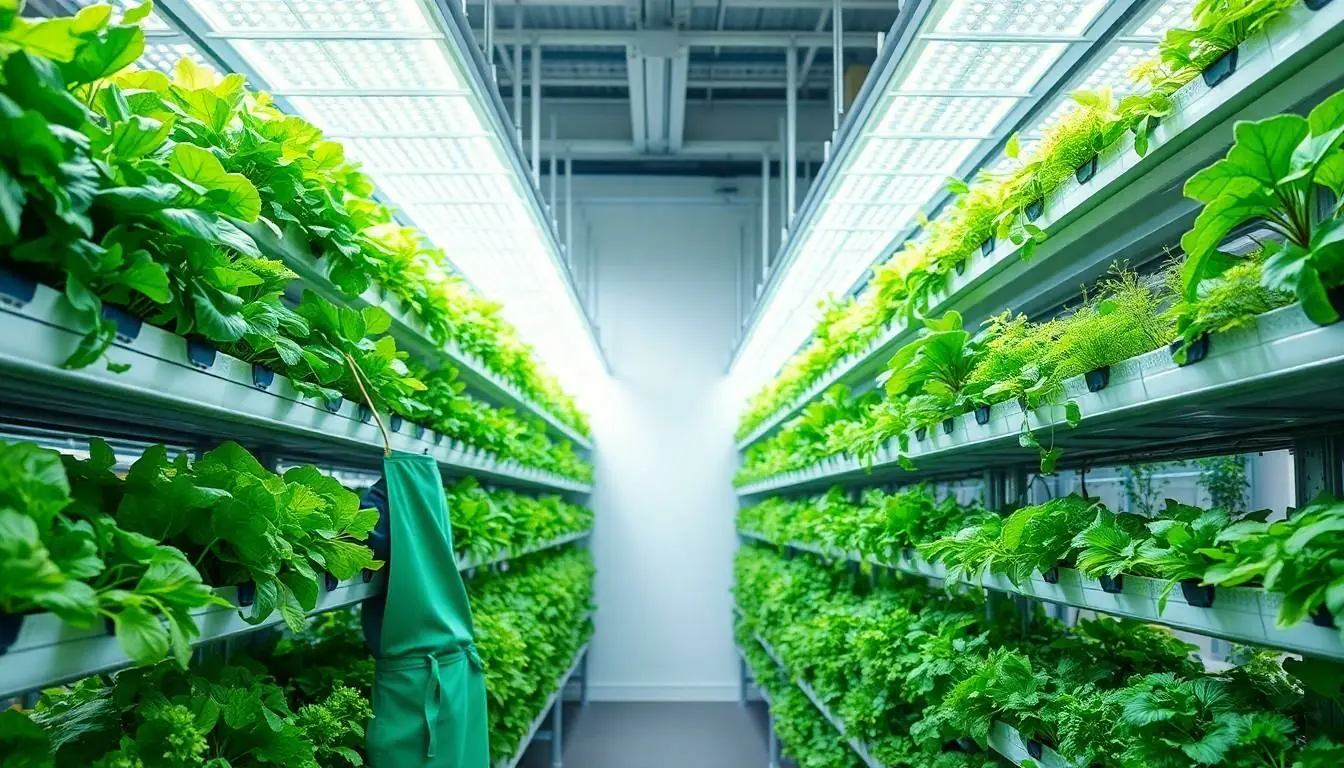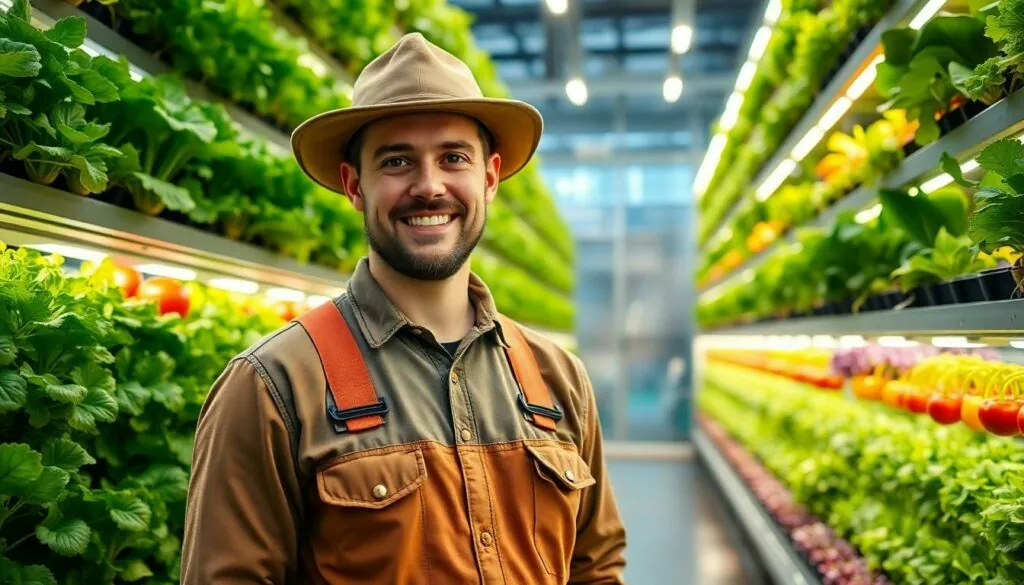In a world where food waste is as common as bad puns, sustainable food technology emerges as the superhero we didn’t know we needed. Imagine a future where your dinner not only tastes great but also saves the planet—sounds like a plot twist straight out of a sci-fi movie, right? But it’s happening now, and it’s more delicious than ever.
Table of Contents
ToggleOverview of Sustainable Food Technology
Sustainable food technology focuses on reducing food waste while enhancing food production methods. Innovations in this field include advanced food preservation techniques, which extend shelf life and minimize spoilage. Additionally, vertical farming uses limited space to produce high yields, conserving water and reducing transportation emissions.
Aquaponics integrates fish farming with plant cultivation, creating a symbiotic ecosystem that maximizes resource efficiency. This approach ensures that both crops and aquatic life thrive, contributing to sustainable food sources. Furthermore, food waste is being repurposed into bioenergy and bioplastics, creating a circular economy model that minimizes landfill impact.
Precision agriculture leverages data analytics and IoT devices to optimize crop management. By using sensors and satellite imagery, farmers can monitor soil health and irrigation needs, leading to improved yields with fewer resources. Cultured meat technologies reduce reliance on traditional livestock farming, decreasing methane emissions and land usage.
Edible packaging is emerging as a way to reduce plastic waste while maintaining food safety. These biodegradable solutions not only protect products but also contribute to environmental sustainability. Research into lab-grown foods continues, addressing global food security concerns while utilizing fewer natural resources.
Sustainable food technology encompasses a range of innovative practices designed to create a more resilient food system. Each advancement not only addresses contemporary challenges but also paves the way for a more sustainable future.
Innovations in Sustainable Food Production

Innovations in sustainable food production are transforming agricultural practices, enhancing efficiency, and supporting environmental conservation. These advancements leverage technology to maximize output while minimizing ecological impact.
Vertical Farming
Vertical farming utilizes limited space by stacking layers of crops in controlled environments. It reduces land use while increasing yield. Various systems, including aeroponics and aquaponics, support this method, allowing crops to grow without soil. Energy-efficient LED lighting further boosts growth rates. Reduced transportation emissions result from local food production, as farms can be situated near urban centers. Higher control over growing conditions leads to less pesticide use and healthier crops. Data shows vertical farms can yield up to 100 times more produce per square foot compared to traditional farming methods.
Aquaponics and Hydroponics
Aquaponics and hydroponics are innovative systems for growing food with minimal resources. Hydroponics relies solely on nutrient-rich water solutions for plant growth, eliminating the need for soil. Aquaponics combines plant cultivation with aquaculture, creating a symbiotic relationship where fish waste provides nutrients for plants, and plants filter water for fish. These methods promote water conservation, using up to 90% less water than conventional farming. Crop cycles accelerate, allowing for year-round harvesting. They also support urban agriculture initiatives, making sustainable food production accessible even in densely populated areas. Studies indicate that aquaponic systems can produce fish and vegetables simultaneously, optimizing space and resources.
Reducing Food Waste with Technology
Advancements in technology significantly reduce food waste while enhancing sustainability. Innovative strategies can optimize resource use and create a more efficient food system.
Smart Inventory Management
Smart inventory management systems utilize real-time data to track food supplies and expiration dates. They enable retailers and restaurants to monitor stock levels, predicting demand accurately. These systems help to minimize over-ordering and ensure timely usage of perishable items. Implementing smart technology also allows businesses to share surplus food with food banks or charities, further reducing waste. According to studies, companies adopting these systems report waste reductions of up to 30%, demonstrating substantial financial and environmental benefits.
Food Preservation Techniques
Food preservation techniques play a crucial role in extending product shelf life and preventing spoilage. Innovations such as vacuum sealing and modified atmosphere packaging help maintain freshness for longer periods. Recently, companies have begun using natural preservatives derived from plants and extracts, which combat microbial growth effectively. High-pressure processing and fermentation techniques further enhance food safety while maintaining nutritional quality. Research indicates that effective preservation methods can reduce food waste by approximately 50%, creating a significant impact on both the economy and the environment.
The Role of Biotechnology in Sustainable Food
Biotechnology plays a crucial role in advancing sustainable food practices. It enables innovative solutions to address food security and environmental concerns.
Genetically Modified Organisms (GMOs)
Genetically modified organisms enhance crop resilience against pests and diseases, reducing the need for chemical pesticides. They can also improve nutritional profiles of staple crops, helping combat malnutrition. Examples include genetically engineered rice enriched with vitamin A, known as Golden Rice, which benefits populations with vitamin deficiencies. These modifications contribute to higher yields, minimizing land use while promoting food security. Data indicates that GMOs can increase crop productivity by up to 20%, significantly impacting global food supply.
Microbial Solutions
Microbial solutions utilize beneficial microbes to enhance soil health and crop growth. These microorganisms facilitate nutrient absorption in plants, boosting overall productivity with less chemical fertilizer. Biofertilizers, derived from natural substances, improve soil fertility and promote sustainable agricultural practices. Studies show that using microbial solutions can increase crop yields by 10-30%, demonstrating their effectiveness in sustainable agriculture. Additionally, these solutions help mitigate environmental impact, fostering a healthier ecosystem for future generations.
The Impact of Consumer Behavior on Sustainable Practices
Consumer behavior significantly influences sustainable food practices. Choices made by individuals can drive demand for eco-friendly products and methods.
Plant-Based Diets
Increasing interest in plant-based diets is reshaping the food industry. Many consumers choose plant-based options to lower their carbon footprint. Research indicates that adopting a plant-based diet can decrease greenhouse gas emissions by up to 50%. This shift encourages food producers to focus on high-quality vegetable ingredients. Nutritionists also point out the health benefits of a plant-centric approach, linking it to lower risks of chronic diseases. Enhanced availability of plant-based products in supermarkets reflects this growing demand.
Ethical Sourcing
Prioritizing ethical sourcing impacts supply chain dynamics. Many consumers seek transparency regarding the origins of their food. Companies responding to this trend promote products sourced from sustainable farms. Data shows that 75% of Americans prefer brands committed to ethical sourcing practices. Ecosystems benefit from this consumer choice, as it encourages responsible farming techniques. Increased awareness of labor practices in food production fosters fair wages and working conditions for agricultural workers. This shift not only meets consumer demand but also supports global sustainability efforts.
Sustainable food technology is paving the way for a more resilient and eco-friendly food system. By integrating innovative practices and advanced technologies, it addresses critical issues like food waste and environmental degradation. As consumers increasingly prioritize sustainability, the food industry is adapting to meet these demands.
The shift towards plant-based diets and ethical sourcing reflects a broader commitment to environmental stewardship and social responsibility. Embracing these advancements not only enhances food production but also fosters a healthier planet for future generations. The future of food lies in balancing enjoyment and sustainability, ensuring that everyone has access to nutritious meals while protecting the environment.




